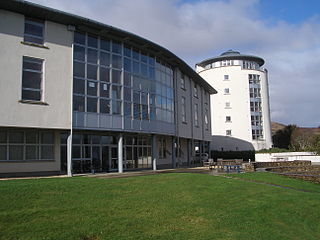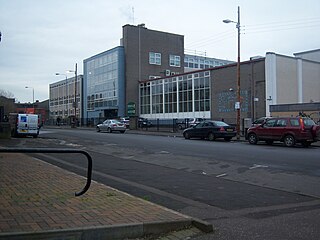Related Research Articles

Scottish Gaelic, also known as Scots Gaelic and Gaelic, is a Goidelic language native to the Gaels of Scotland. As a Goidelic language, Scottish Gaelic, as well as both Irish and Manx, developed out of Old Irish. It became a distinct spoken language sometime in the 13th century in the Middle Irish period, although a common literary language was shared by the Gaels of both Ireland and Scotland until well into the 17th century. Most of modern Scotland was once Gaelic-speaking, as evidenced especially by Gaelic-language place names.

A Gaelscoil is an Irish language-medium school in Ireland: the term refers especially to Irish-medium schools outside the Irish-speaking regions or Gaeltacht. Over 50,000 students attend Gaelscoileanna at primary and second-level on the island of Ireland. A further over 13,000 students are receiving their primary and second level education through Irish in the Gaeltacht. Gaelscoileanna and Irish-medium schools in the Gaeltacht are supported and represented by Gaeloideachas and An Chomhairle um Oideachas Gaeltachta & Gaelscolaíochta or COGG in the Republic of Ireland and by Comhairle na Gaelscolaíochta in Northern Ireland.

BBC Scotland is a division of the BBC and the main public broadcaster in Scotland.

Scottish nationalism promotes the idea that the Scottish people form a cohesive nation and national identity.

Sabhal Mòr Ostaig is a public higher education college situated in the Sleat peninsula in the south of the Isle of Skye, with an associate campus at Bowmore on the island of Islay, Ionad Chaluim Chille Ìle. Sabhal Mòr is an independent Academic Partner in the federal University of the Highlands and Islands. Uniquely, its sole medium of instruction on degree courses is Scottish Gaelic.

Canadian Gaelic or Cape Breton Gaelic, often known in Canadian English simply as Gaelic, is a collective term for the dialects of Scottish Gaelic spoken in Atlantic Canada.
Gaelic broadcasting in Scotland is a developing area of the media in Scotland which deals with broadcasts given in Scottish Gaelic and has important links with the efforts of Gaelic revival in Scotland. As well as being informative, Gaelic broadcasting in Scotland has acquired some symbolic importance. Whilst opinion polls show that the vast majority of Gaels feel they have been ill-served by broadcasting media, Scotland now has Gaelic broadcasting all over Scotland both on television and radio.

BBC Alba is a Scottish Gaelic-language free-to-air public broadcast television channel jointly owned by the BBC and MG Alba. The channel was launched on 19 September 2008 and is on-air for up to seven hours a day with BBC Radio nan Gàidheal simulcasts. The name Alba is the Scottish Gaelic name for Scotland. The station is unique in that it is the first channel to be delivered under a BBC licence by a partnership and was also the first multi-genre channel to come entirely from Scotland with almost all of its programmes made in Scotland.

Gaelic-medium education is a form of education in Scotland that allows pupils to be taught primarily through the medium of Scottish Gaelic, with English being taught as the secondary language.
Gofraid is an Irish masculine given name, arising in the Old Irish and Middle Irish/Middle Gaelic languages, as Gofhraidh, and later partially Anglicised as Goffraid.
Eachann is a masculine given name in the Scottish Gaelic. A similar and possibly related early form of the name was Eachdonn. The name is composed of two elements; the first element is each, meaning "horse". The second element is donn, which has been given two different meanings. One proposed meaning is "brown"; another proposed meaning is "lord". The early Gaelic form of the name, Eachdonn, was 'confused' with the Norse Hakon.
Lachlan is a masculine given name, an Anglicised derivative from Irish Gaelic and Scottish Gaelic.
Alexander Mackenzie, was a Scottish historian, author, magazine editor and politician. He was born on a croft, in Gairloch. He had little opportunity for education and initially earned his living as a labourer and ploughman. In 1861 he became apprenticed in the clothes trade selling Scottish cloth in Colchester. In 1869 he settled in Inverness, where he and his brother set up a clothes shop in Clach na Cudainn House. From his business premises he derived his nickname 'Clach na Cudainn' or simply 'Clach'. He later became an editor and publisher of the Celtic Magazine, and the Scottish Highlander. Mackenzie wrote numerous clan histories. He was a fellow of the Society of Antiquaries of Scotland. A founder member of the Gaelic Society of Inverness, Mackenzie was elected an 'Honorary Chieftain' in 1894.
MacEachainn is a masculine surname in Scottish Gaelic. The name translates into English as "son of Eachann". The feminine form of the name is NicEachainn, which translates to "daughter of the son of Eachann". These surnames originated as a patronyms. However, they no longer refer to the actual name of the bearer's father or grandfather. There are numerous Anglicised forms of MacEachainn.
Norman Hector Mackinnon Maclean was a Scottish Gaelic comedian, novelist, poet, musician and broadcaster. He is the only person to have won both Bardic Crown and Gold Medal at the same Royal National Mòd. His struggles with alcoholism are documented in his autobiography, The Leper's Bell: Autobiography of a Changeling.

Melness is a locality, comprising a group of small remote crofting townships, lying to the west of Tongue Bay opposite Coldbackie, in the north coast of Sutherland, Scottish Highlands and is in the Scottish council area of Highland. The individual hamlets are:
Gairm was a Scottish Gaelic quarterly magazine founded in 1951 by Derick Thomson, and Finlay J. MacDonald. Its first issue was published in Autumn 1952. MacDonald served as an editor until 1964; Thomson remained present for decades until it ceased publication in 2004, producing just over 200 issues in total. According to Alan Campbell, the magazine was a "one-man show;" he explained that Thomson "sustained something very valuable for a long period of time." Although it had a relatively low circulation, it was influential on Gaelic literature as it was the longest-running Gaelic literary magazine of the 20th century, in circulation for more than twice as long as its predecessor, Guth na Bliadhna. Gairm attempted to encompass a variety of perspectives and themes, and "disseminated a lot of work that we weren't aware of" in the words of Martin MacDonald. As well as being familiar to most literate Gaels, the magazine attracted almost all influential Gaelic writers who were active, including Sorley MacLean, Iain Crichton Smith, George Campbell Hay, and Dòmhnall MacAmhlaigh.
Sgoil Ghàidhlig an Àrd-Bhaile promotes, provides and supports community-based, authentic Nova Scotia Gaelic language learning, within a cultural context, for people of all ages in the Halifax Regional Municipality. Sgoil Ghàidhlig’s language immersion courses utilize a methodology known as "Total Immersion Plus" (TIP), which was introduced to Nova Scotia by Finlay MacLeod of Comhairle nan Sgoiltan Àraich, the Scottish Gaelic Preschools Association. Immersion courses of this type are also known as Gàidhlig aig Baile or "Gaelic in the Community".

Milton is a village in Glenurquhart, to the west of the village of Drumnadrochit, in the Highland council area of Scotland. It lies on the north side of the River Enrick, next to the A831 road.